高中外研版必修三Unit1Europe语法——被动语态详析及练习(有答案)
文档属性
| 名称 | 高中外研版必修三Unit1Europe语法——被动语态详析及练习(有答案) |
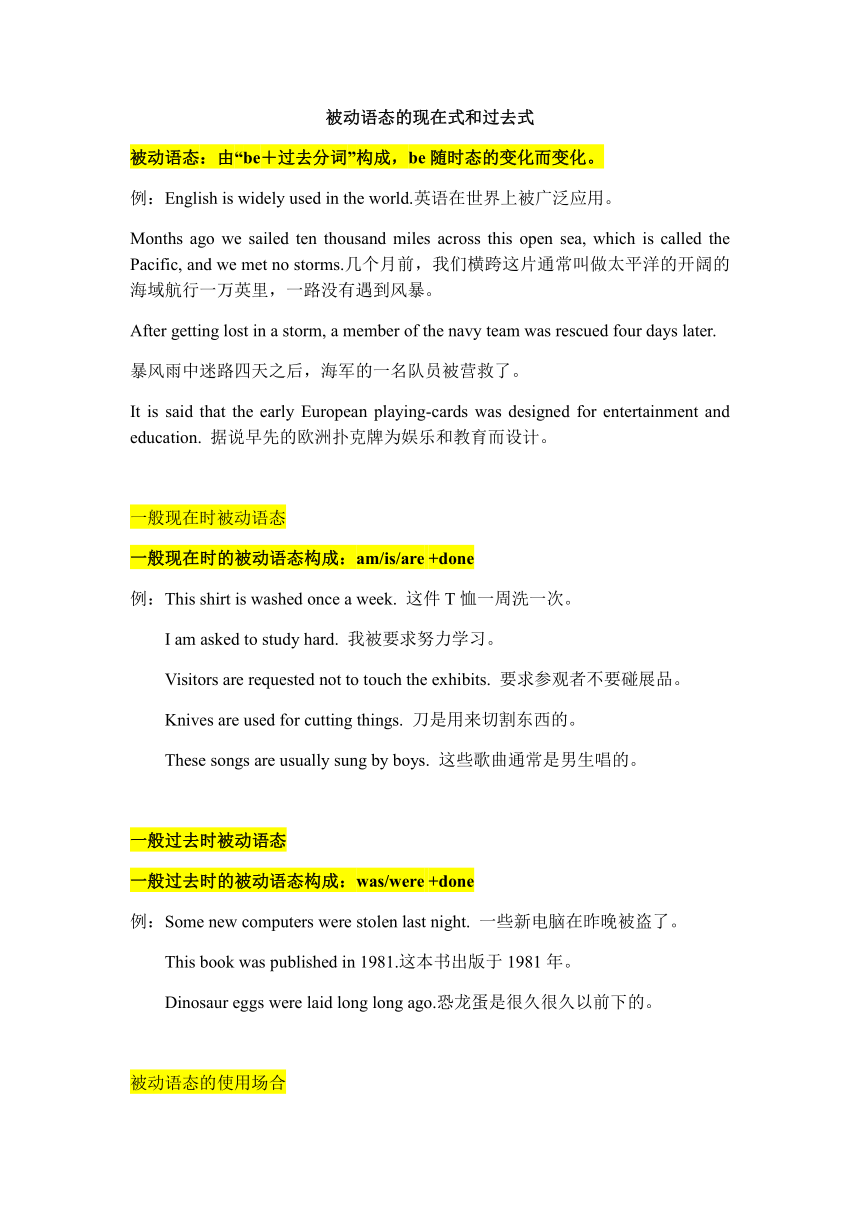
|
|
| 格式 | zip | ||
| 文件大小 | 47.5KB | ||
| 资源类型 | 教案 | ||
| 版本资源 | 外研版 | ||
| 科目 | 英语 | ||
| 更新时间 | 2020-02-17 00:00:00 | ||
图片预览

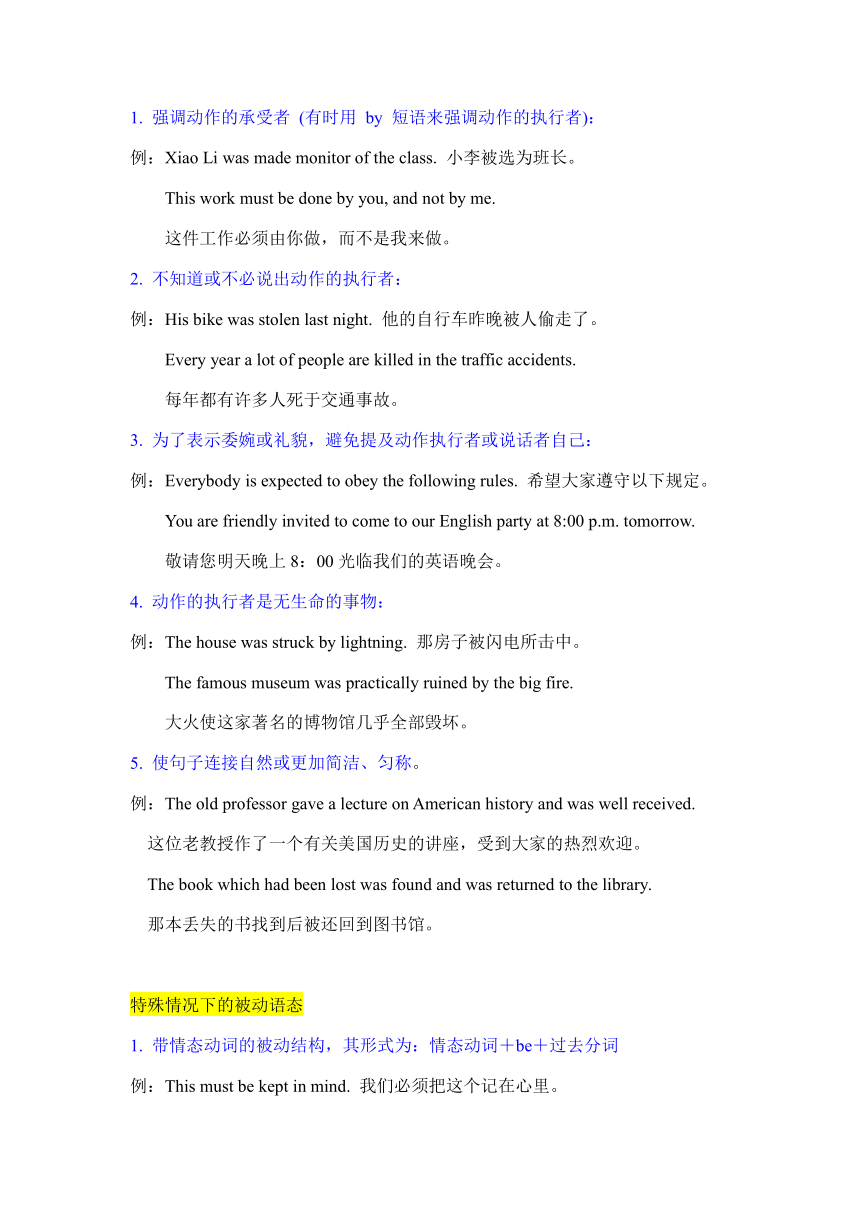
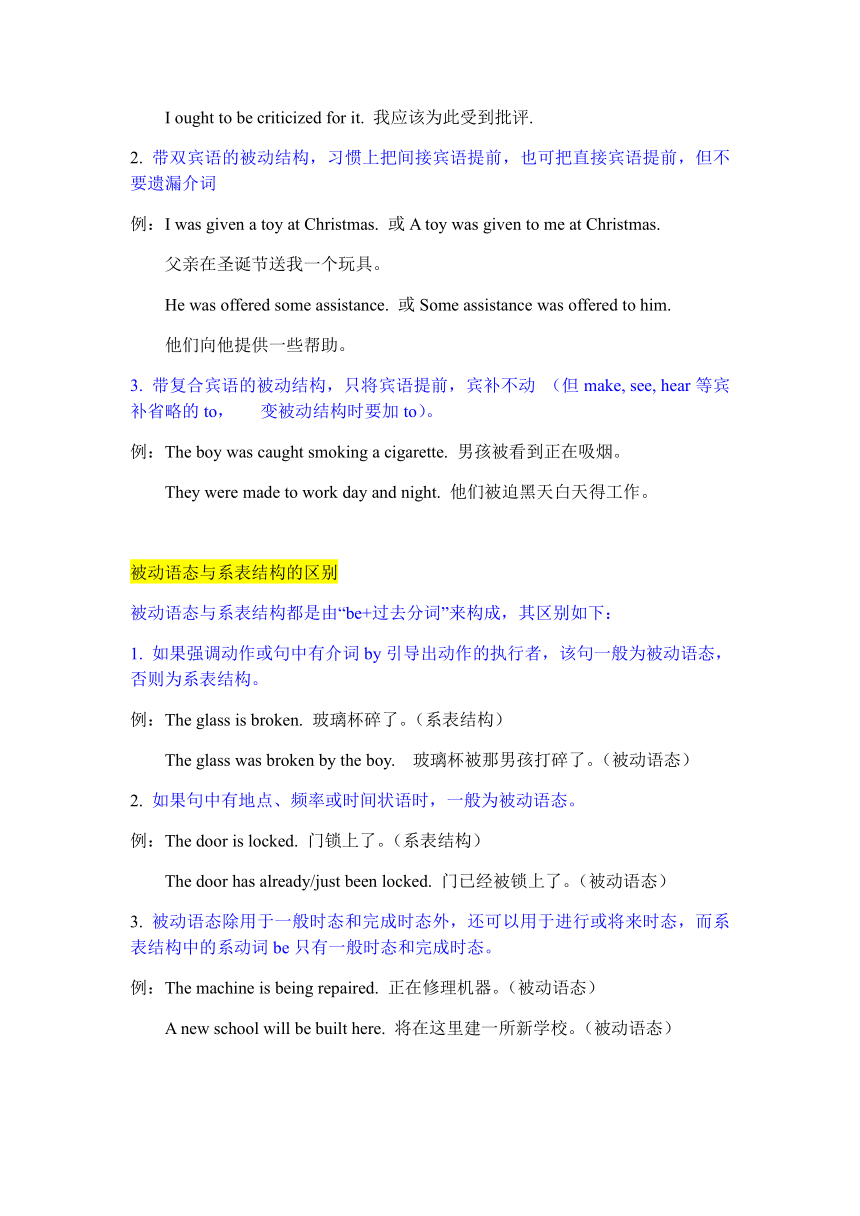
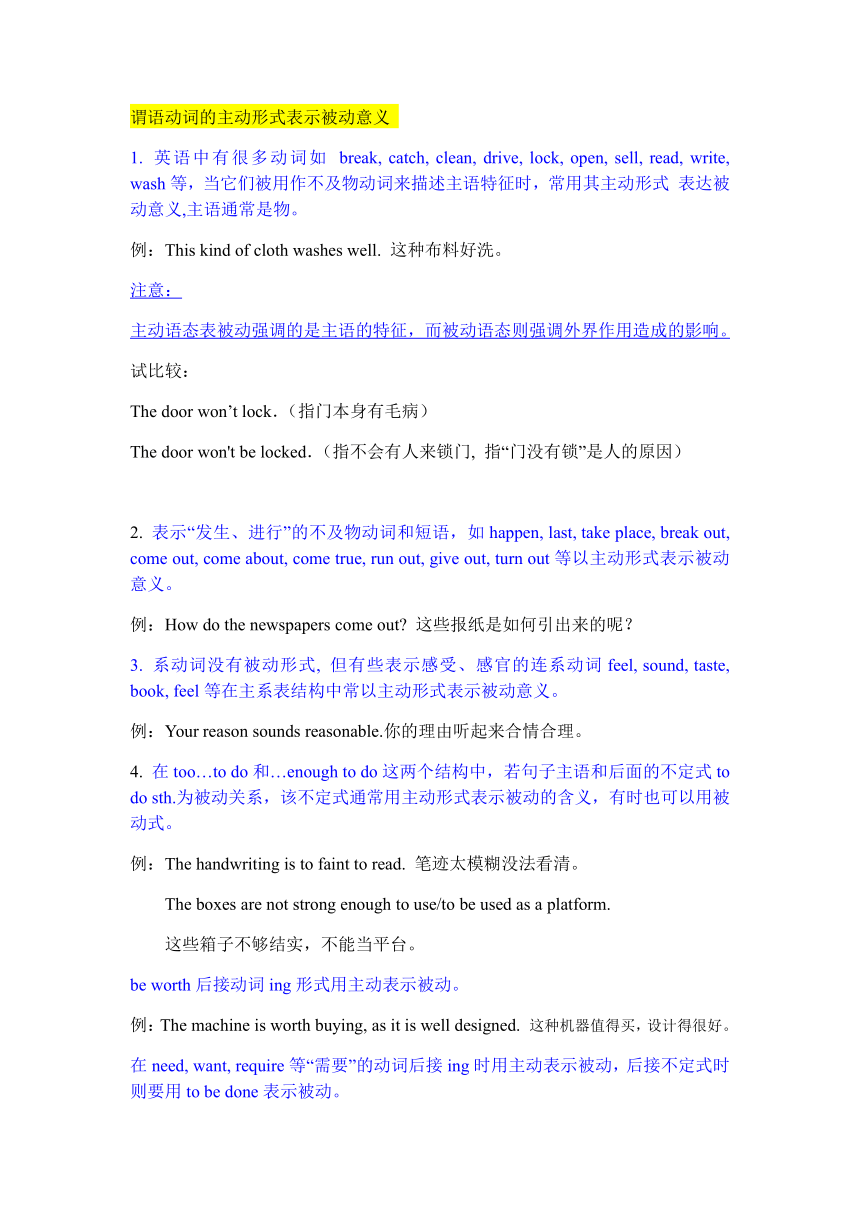
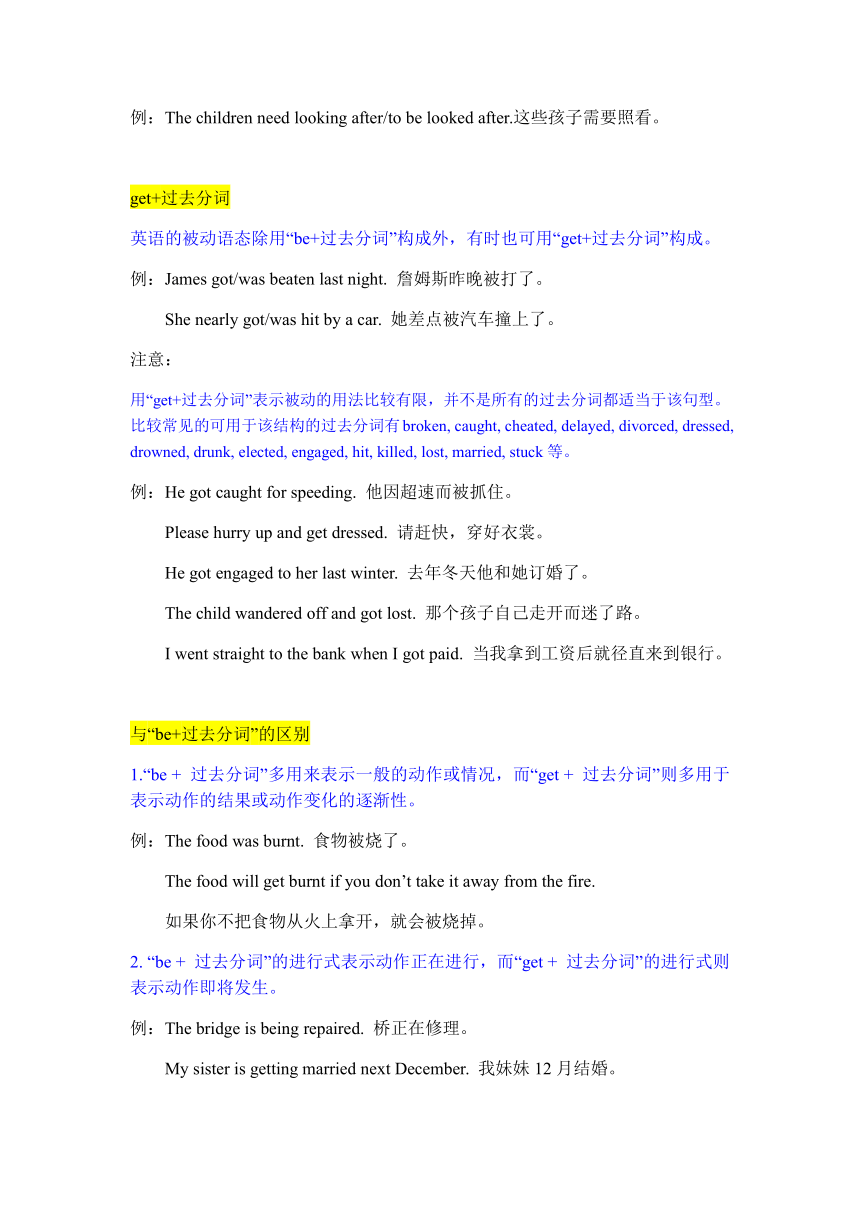
文档简介
被动语态的现在式和过去式
被动语态:由“be+过去分词”构成,be随时态的变化而变化。
例:English is widely used in the world.英语在世界上被广泛应用。
Months ago we sailed ten thousand miles across this open sea, which is called the Pacific, and we met no storms.几个月前,我们横跨这片通常叫做太平洋的开阔的海域航行一万英里,一路没有遇到风暴。
After getting lost in a storm, a member of the navy team was rescued four days later.
暴风雨中迷路四天之后,海军的一名队员被营救了。
It is said that the early European playing-cards was designed for entertainment and education. 据说早先的欧洲扑克牌为娱乐和教育而设计。
一般现在时被动语态
一般现在时的被动语态构成:am/is/are +done
例:This shirt is washed once a week. 这件T恤一周洗一次。
I am asked to study hard. 我被要求努力学习。
Visitors are requested not to touch the exhibits. 要求参观者不要碰展品。
Knives are used for cutting things. 刀是用来切割东西的。
These songs are usually sung by boys. 这些歌曲通常是男生唱的。
一般过去时被动语态
一般过去时的被动语态构成:was/were +done
例:Some new computers were stolen last night. 一些新电脑在昨晚被盗了。
This book was published in 1981.这本书出版于1981年。
Dinosaur eggs were laid long long ago.恐龙蛋是很久很久以前下的。
被动语态的使用场合
1. 强调动作的承受者 (有时用 by 短语来强调动作的执行者):
例:Xiao Li was made monitor of the class. 小李被选为班长。
This work must be done by you, and not by me.
这件工作必须由你做,而不是我来做。
2. 不知道或不必说出动作的执行者:
例:His bike was stolen last night. 他的自行车昨晚被人偷走了。
Every year a lot of people are killed in the traffic accidents.
每年都有许多人死于交通事故。
3. 为了表示委婉或礼貌,避免提及动作执行者或说话者自己:
例:Everybody is expected to obey the following rules. 希望大家遵守以下规定。
You are friendly invited to come to our English party at 8:00 p.m. tomorrow.
敬请您明天晚上8:00光临我们的英语晚会。
4. 动作的执行者是无生命的事物:
例:The house was struck by lightning. 那房子被闪电所击中。
The famous museum was practically ruined by the big fire.
大火使这家著名的博物馆几乎全部毁坏。
5. 使句子连接自然或更加简洁、匀称。
例:The old professor gave a lecture on American history and was well received.
这位老教授作了一个有关美国历史的讲座,受到大家的热烈欢迎。
The book which had been lost was found and was returned to the library.
那本丢失的书找到后被还回到图书馆。
特殊情况下的被动语态
1. 带情态动词的被动结构,其形式为:情态动词+be+过去分词
例:This must be kept in mind. 我们必须把这个记在心里。
I ought to be criticized for it. 我应该为此受到批评.
2. 带双宾语的被动结构,习惯上把间接宾语提前,也可把直接宾语提前,但不要遗漏介词
例:I was given a toy at Christmas. 或A toy was given to me at Christmas.
父亲在圣诞节送我一个玩具。
He was offered some assistance. 或Some assistance was offered to him.
他们向他提供一些帮助。
3. 带复合宾语的被动结构,只将宾语提前,宾补不动 (但make, see, hear等宾补省略的to, 变被动结构时要加to)。
例:The boy was caught smoking a cigarette. 男孩被看到正在吸烟。
They were made to work day and night. 他们被迫黑天白天得工作。
被动语态与系表结构的区别
被动语态与系表结构都是由“be+过去分词”来构成,其区别如下:
1. 如果强调动作或句中有介词by引导出动作的执行者,该句一般为被动语态,否则为系表结构。
例:The glass is broken. 玻璃杯碎了。(系表结构)
The glass was broken by the boy. 玻璃杯被那男孩打碎了。(被动语态)
2. 如果句中有地点、频率或时间状语时,一般为被动语态。
例:The door is locked. 门锁上了。(系表结构)
The door has already/just been locked. 门已经被锁上了。(被动语态)
3. 被动语态除用于一般时态和完成时态外,还可以用于进行或将来时态,而系表结构中的系动词be只有一般时态和完成时态。
例:The machine is being repaired. 正在修理机器。(被动语态)
A new school will be built here. 将在这里建一所新学校。(被动语态)
谓语动词的主动形式表示被动意义
1. 英语中有很多动词如 break, catch, clean, drive, lock, open, sell, read, write, wash等,当它们被用作不及物动词来描述主语特征时,常用其主动形式 表达被动意义,主语通常是物。
例:This kind of cloth washes well. 这种布料好洗。
注意:
主动语态表被动强调的是主语的特征,而被动语态则强调外界作用造成的影响。
试比较:
The door won’t lock.(指门本身有毛病)
The door won't be locked.(指不会有人来锁门, 指“门没有锁”是人的原因)
2. 表示“发生、进行”的不及物动词和短语,如happen, last, take place, break out, come out, come about, come true, run out, give out, turn out等以主动形式表示被动意义。
例:How do the newspapers come out? 这些报纸是如何引出来的呢?
3. 系动词没有被动形式, 但有些表示感受、感官的连系动词feel, sound, taste, book, feel等在主系表结构中常以主动形式表示被动意义。
例:Your reason sounds reasonable.你的理由听起来合情合理。
4. 在too…to do和…enough to do这两个结构中,若句子主语和后面的不定式to do sth.为被动关系,该不定式通常用主动形式表示被动的含义,有时也可以用被动式。
例:The handwriting is to faint to read. 笔迹太模糊没法看清。
The boxes are not strong enough to use/to be used as a platform.
这些箱子不够结实,不能当平台。
be worth后接动词ing形式用主动表示被动。
例:The machine is worth buying, as it is well designed. 这种机器值得买,设计得很好。
在need, want, require等“需要”的动词后接ing时用主动表示被动,后接不定式时则要用to be done表示被动。
例:The children need looking after/to be looked after.这些孩子需要照看。
get+过去分词
英语的被动语态除用“be+过去分词”构成外,有时也可用“get+过去分词”构成。
例:James got/was beaten last night. 詹姆斯昨晚被打了。
She nearly got/was hit by a car. 她差点被汽车撞上了。
注意:
用“get+过去分词”表示被动的用法比较有限,并不是所有的过去分词都适当于该句型。比较常见的可用于该结构的过去分词有broken, caught, cheated, delayed, divorced, dressed, drowned, drunk, elected, engaged, hit, killed, lost, married, stuck等。
例:He got caught for speeding. 他因超速而被抓住。
Please hurry up and get dressed. 请赶快,穿好衣裳。
He got engaged to her last winter. 去年冬天他和她订婚了。
The child wandered off and got lost. 那个孩子自己走开而迷了路。
I went straight to the bank when I got paid. 当我拿到工资后就径直来到银行。
与“be+过去分词”的区别
1.“be + 过去分词”多用来表示一般的动作或情况,而“get + 过去分词”则多用于表示动作的结果或动作变化的逐渐性。
例:The food was burnt. 食物被烧了。
The food will get burnt if you don’t take it away from the fire.
如果你不把食物从火上拿开,就会被烧掉。
2. “be + 过去分词”的进行式表示动作正在进行,而“get + 过去分词”的进行式则表示动作即将发生。
例:The bridge is being repaired. 桥正在修理。
My sister is getting married next December. 我妹妹12月结婚。
3. “get + 过去分词”表示突然发生而未曾料到的情况,虽可表示状态,但更强调动作,而“be + 动词的过去分词”多表示状态。
例:Some glasses got broken when we were moving.
我们在搬家时有些玻璃杯被打破了。
Be careful. One of the legs of that table is broken.
小心,那张桌子的一条腿断了。
“介词in, on, under等+名词”表被动意义
表示方位的介词与含动作意义的名词合用,含被动之义,其意义相当于该名词相应动词的被动形式,名词前一般不用冠词。
1. “under +名词”结构,表示“某事在进行中”。常见的有:under control(受控制), under treatment(在治疗中), under repair(在修理中), under discussion(在讨论中), under construction(在施工中)。
例:The building is under construction (is being constructed). 这栋建筑还在建造中。
2.“beyond+名词”结构,“出乎……,胜过……、范围、限度”。常见的有:beyond belief (令人难以置信),beyond one’s reach(鞭长莫及),beyond one’s control(无法控制),beyond our hope 始料不及。
例:The rumour is beyond belief(can’t be believed). 流言不可信。
3.“above+名词”结构, 表示“(品质、行为、能力等) 超过……、高于……”。
例:His honest character is above all praise.
=His honest character cannot be praised enough.
他诚实的个性怎么称赞都不为过。
4.“for+名词”结构,表示 “适于……、 为着……”。如:for sale(出售), for rent(出租)等。
例:That house is for sale. (= That house is to be sold.) 那所房子待售。
5.“in+名词”结构 ,表示“在……过程中或范围内”常见的有:in print(在印刷中),in sight(在视野范围内),等。
例:The book is not yet in print (is not yet printed).那本书还没付印。
6.“on+名词”结构, 表示“在从事…… 中”。常见的有:on sale(出售),on show(展出), on trial(受审)。
例:Today some treasures are on show in the museum (= are being showed).
一些珠宝正在博物馆展出。
7.“out of+名词”结构表示“超出…… 之外”,常见的有:out of control (控制不了),out of sight(超出视线之外),out of one’s reach(够不着), out of fashion(不流行)等。
例:The plane was out of control (couldn’t be controlled). 飞机失控了。
8.“within+名词”结构,“在……内、不超过……”。
例:He took two days off within the teacher’s permission.他被允许请假两天。
含有被动语态的名言名句
A man is known by his friends. 什么人交什么朋友。
Don’t put off till tomorrow what should be done today.今日事,今日毕。
Experience must be bought.吃一堑,长一智。
He is not laughed at that laughs at himself first.自嘲者不会让人见笑。
Lost time is never found again.岁月既往,一去不回。
Many things grow in the garden that were never sown there.
有心栽花花不发,无心插柳柳成荫。
No man is born wise or learned.没有生而知之者。
The finest diamond must be cut.玉不琢,不成器。
If a thing is worth doing it is worth doing well. 如果事情值得做,就值得做好。
Nothing great was ever achieved without enthusiasm. 无热情成就不了伟业。
Life is half spent before we know what it is.人过半生,方知天命。
Love cannot be compelled.爱情不能强求。
Nothing is to be got without pains but poverty. 世上唯有贫穷可以不劳而获。
A tree is known by its fruit. A bird is known by its note and a man by his talk.
闻其歌知其鸟,听其言知其人。
What may be done at any time will be done at no time. 明日待明日,明日不再来。
Books, like friends, should be few and well chosen. 读书如择友,宜少且宜精。
A true friend is known in the day of adversity. 患难见真情。
A servant is known by his master’s absence. 主人不在可以看出仆人的品行来。
All things are easy that are done willingly. 做事乐意,诸事容易。
A hero is known in the time of misfortune. 时势造英雄。
Nothing is given so freely as advice. 劝人最容易。
A friend without faults will never be found. 没有十全十美的朋友。
A good beginning is half done. 良好的开端是成功的一半。
A liar is not believed when he speaks the truth. 说谎者即使讲真话也没人相信。
巩固练习
一、用下列动词的被动语态形式填空
1. Many trees ___________ (plant) in China every year, but they are still not enough.
2. The Great Wall ___________________ (build) thousands of years ago.
3. You have to be 18 years old before you ________________ (allow) to drive a car.
4. Now many difficult and dangerous kinds of work ___________ (can do) by robots in factories.
5. It is said that more good teachers ________ (send) to the rural areas in Xinxiang next year.
6. To make our city more beautiful, rubbish ________ (must not throw) into the river.
7. The problem ___________________ (discuss) at the meeting now.
8. _____________Were these machines ________________ (invent) by Edison?
9. English __________________ (speak) by most people in the USA.
10. Ways ___________ already _____________ (find) to make waste water clean.
11. Which language _______the most widely_______(speak)in the world?
12.Last year a large number of trees______________(cut)down.
13. The students _____ often _____ (tell) to take care of their desks and chairs.
14. What _______ knives ______ (make) of? They_______________(make) of metal(金属) and wood.
15. The room _____________ (clean) by me every day.
16. This kind of shoes __________ (sell) well.
17. The food _____________ (smell) delicious.
二、主动语态变为被动语态
1. Bruce writes a letter every week.
2. This factory produces machine tools.
3. They often make fun of her.
4. Everyone respects her.
5. We clean our classroom every day.
6. Do you wash your clothes very often?
7. Most people in the USA speak English.
8. People listen to this programme in many countries.
9. People speak English in many countries.
10. Do you often clean your room?
11. His mother gave him a present for his birthday.
三、单项选择
1. It is reported that a space station ___ on the moon in years to come. (2015安徽29)
A. will be building B. will he built C. has been building D. has been built
2. In my hometown, there is always a harvest supper for the farmers after all the wheat____ cut. (2015重庆13)
A. will have been B. will be C. was D. has been
3. Despite the previous rounds of talks, no agreement______ so far by the two sides.(2015天津9)
A. has been reached B. was reached C. will reach D. will have reached
4. More expressways _________ in Sichuan soon to promote the local economy. (2015四川4)
A. are being built B. will be built C. have been built D. had been built
5. I had a strong desire to reach in and play with the toy, but_______ thankfully by the shop window(2015湖南32)
A. am held back B. held back C. hold back D. was held back
6. To my delight, I___________ from hundreds of applicants to attend the opening ceremony. (2015福建26)
A. was chosen B. was being chosen C. would choose D. had chosen
7. —Did you enjoy the party?
—Yes. We _____well by our hosts. (2015北京22)
A. were treated B. would be treated C. treated D. had treated
8. The president _____ a cool reception when he visited London.
A. gave B. was given C. had given D. had been given
9. A red sky in the morning _____ to be a sign of bad weather.
A. says B. is saying C. has said D. is said
10. If you go there alone after dark you might get _____.
A. attacked and robbed B. attacking and robbing
B. to attack and rob D. to be attacked and robbed
11. I’ll come after the meeting if time ______.
A. permits B. is permitting C. is permitted D. has permitted
12. The students _____ £50 a year to cover the cost of books and stationery.
A. give B. are given C. have given D. to give
13. He kept a little notebook, in which ______ the names and addresses of his friends.
A. wrote B. was writing C. was written D. were written
14. It ______ that there was a car over there.
A. so happened B. so happens C. is so happened D. was so happened
四、句子翻译
1. 据说,她能说几种外国语。
2. 据悉,地震后许多人无家可归(homeless)
3. 不言而喻,这是最近谈判(recent negotiations)的结果。
4. 大家认为她已经康复。
5. 估计总统即将发表声明。
6. 这个问题明天上午讨论吗?
7. 这件事马上可以做
8. 这水库将提前完工。
9. 现在广播里正在教唱新歌。
10. 首先一定要保证质量。
11. 浦东又办了一所学校。
12. 必须承认中国还是一个发展中国家。
13. 必须指出台湾问题是中国的内政(internal affairs)。
14. 这个英语读本很畅销。
15. 瓷槽(porcelain sink)容易洗净。
16. 这抽屉锁不上。
17. 牛奶容易变质。
18. 这条鱼能放到明天吗?
答案与解析
一、用下列动词的被动语态形式填空
1. are planted 2.was built 3.are allowed 4.can be done
5. will be sent 6.mustn’t be thrown 7. is being discussed
8. Were …invented 9.is spoken 10.have…been found
11. is spoken 12.were cut 13. are told 14. are made , are made
15. is cleaned 16.sells 17. smells
二、主动语态变为被动语态
1. A letter is written by Bruce every week.
2. Machine tools are produced in this factory.
3. She is often made fun of.
4. She is respected by everyone.
5. Our classroom is cleaned by us every day.
6. Are your clothes washed very often?
7. English is spoken by most people in the USA.
8. This programme is listened to in many countries.
9. English is spoken in many countries.
10. Is your room often cleaned by you?
11. He was given a present for his birthday (by his mother).
三、单项选择
1. B.句意:据报道,人们在接下来的几年里将在月球上建一个空间站。根据in the years to come可知用将来时,space station 和build是动宾关系,应该用被动语态。
2. D.句意:在我的老家,农民们在麦子收割之后总有一顿收获的聚餐。对于wheat是被收割,用被动语态,而且空格所在为一个状语从句,用现在完成时代替将来完成时。
3. A.句意:尽管有之前几轮会谈,到目前为止双方并没有达成一致。对于agreement来说应该是被达成,用被动语态形式。另有时间状语so far,综合起来用现在完成时被动语态。
4. B.句意:很快在四川会修更多的高速公路,以促进经济的发展。对于expressways来说是被修建,用被动语态;结合时间状语soon,用将来时被动语态。
5. D。句意:我很想伸进去玩那个玩具,但幸亏被橱窗挡住了。but连接的两个并列句共用主语I,对主语来说被阻挡,用被动语态,根据并列句的前半部分had,应该用一般过去时的被动语态。
6. A。句意:让我高兴的是,我从数百的申请者中被选上参加开幕式。对于句子主语I来说是被选上,用被动语态,这是陈述过去的事情,用一般过去时的被动语态。
7.A。句意:—你喜欢那个晚会吗?—是的,我们被盛情款待。对句子主语来说是被款待,结合问句的时态,用一般过去时被动语态。
8. 选B。一方面语意要求要被动语态,另一方面从句时态暗示主句应用一般过去时。
9. 选D。此句也可说成 It is said that a red sky in the morning is a sign of bad weather.
10. A。“get + 过去分词”表被动。
11. A。该用法中的 permit 为不及物动词,不用被动语态。其中if time permits 也可换成 time permitting。
12. B。谓语为 give sb. sth 结构的被动语态形式。
13. D。in which were written the names and addresses…为倒装句式,其正常表达为 the names and addresses of his friends were written in the notebook。
14. A。happen是不及物动词,无被动语态。
四、句子翻译
1.It is said that she can speak several foreign languages.
2.It is believed that a lot of people will be homeless after the earthquake.
3.It is known that this is the result of the recent negotiations.
4.It is thought that she has recovered.
5.It is estimated that the president will declare a statement.
6.Will the issue be discussed tomorrow morning?
7.This matter can be done at once.
8.The reservoir will be finished ahead of the schedule.
9.A new song is being taught in the radio now.
10.First of all, quality must be guaranteed.
11.A school was set up in Pudong again.
12.It must be admitted that China is still a developing country.
13.It must be pointed out that the problem of Taiwan is China's internal affairs.
14.This English book sells well.
15.The porcelain sink cleans easily.
16.The drawer won't lock.
17.Milk goes bad easily.
18.Can the fish be kept till tomorrow?
